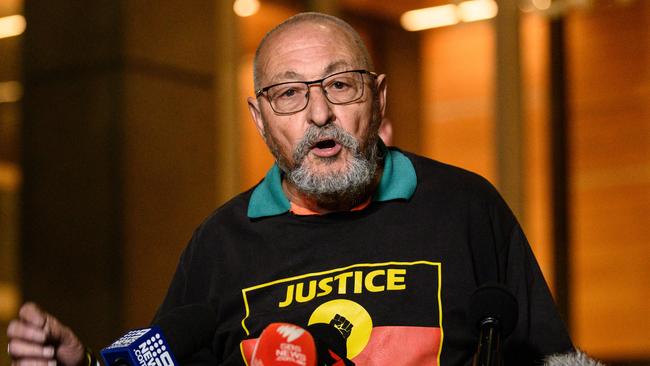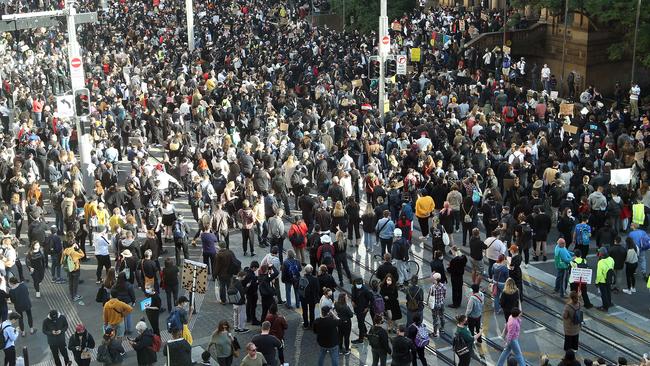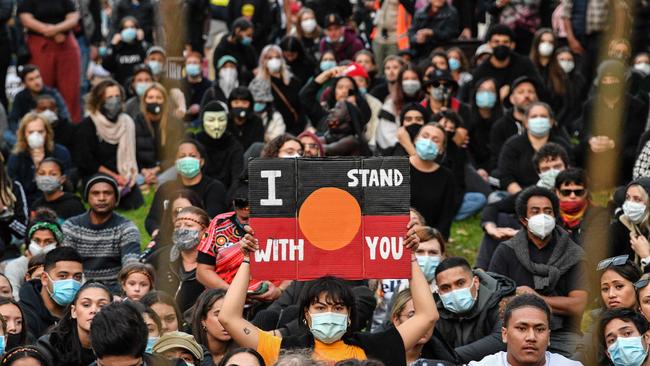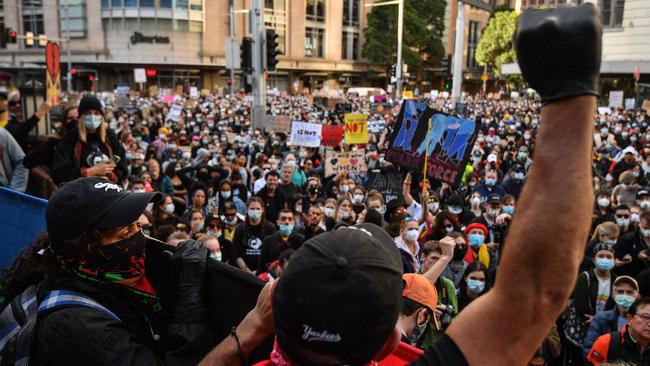Sydney Black Lives Matter protest: No COVID-19 quarantine necessary
The organiser of Sydney’s mass Black Lives Matter demonstration has defied warnings from medical experts that he and all protesters should now self-isolate for 14 days, claiming the thousands in attendance had practised social distancing.
NSW Coronavirus News
Don't miss out on the headlines from NSW Coronavirus News. Followed categories will be added to My News.
- Tim Blair: Protesters spread more than their message
- Guns seized as man charged over Police Minister death threat
The organiser of Sydney’s mass Black Lives Matter demonstration has defied warnings from medical experts that he and all protesters should now self-isolate for 14 days, claiming the thousands in attendance had practised social distancing.
Australian Medical Association president Tony Bartone yesterday urged anyone who took part in the multiple demonstrations across the nation on Saturday to consider self isolating in a bid to limit the risk of spreading the coronavirus.
But Sydney protest organiser Raul Bassi — who went to court to overturn a decision to ban the rally — said all 20,000 people on Saturday were appropriately socially distanced and did not need to go into quarantine.

“If they want to self isolate they can but we don’t think it is necessary because we followed all the rules,” the 73-year-old activist said.
“We had plenty of face masks and hand sanitiser and everyone was appropriately distanced. I walked from one side of the demonstration in the park to the other and did not have to say excuse me once because everyone was separated.”
But Dr Bartone believes the large protest was a risk to public health.
“What we saw on the weekend and indeed at any mass gathering of that size, regardless of the cause, regardless of the position, is the potential to put the community at risk,” Dr Bartone said. “It was clearly against the advice of all health authorities.’’
Dr Bartone said protesters should self isolate out of “an abundance of caution”.

“It is appropriate that they consider their role and their position and also look at the option of isolating themselves from the rest of the community for that two-week period," Dr Bartone said.
“We only need one infectious person to have attended the rally.”
It comes as NSW Health reported three new coronavirus cases yesterday — two from known travellers in hotel quarantine and one still under investigation — to increase the total number of cases to 3112.
“The virus is likely to be still circulating in the community,” the department warned in a statement. Despite organisers of the Sydney rally ignoring Dr Bartone’s warning, organisers of the Melbourne rally took to Facebook to tell protesters to self isolate.
Warriors of the Aboriginal Resistance in Melbourne told protesters: “We want to thank everyone for taking the precautions seriously and wearing a mask.

“I think about 99 per cent of you did it! It was amazing to see.
“Please ensure you self-isolate for at least 14 days after the rally.
“Speak to a doctor if you have cold or flu-like symptoms.”
Deputy chief medical officer Dr Nick Coatsworth also said any protester developing symptoms of coronavirus needed to get tested.
Dr Coatsworth said the yelling and shouting at protests would spread the virus further than normal speech.
But whether the rallies would delay or accelerate the easing of restrictions was a matter of “wait and see,” he said. Dr Coatsworth said the rallies were not comparable to getting spectators back in stadiums. “I guess in principle there is a rather big difference between a single protest and a return to spectator sport in Australia.”
POLICE VOW TO REFUSE FUTURE PROTEST PERMITS
Police would refuse to issue permits allowing large protests during the COVID-19 pandemic, under a plan from the minister to stop more risky rallies from going ahead.
“My view is, because of the health orders and while COVID is undergoing, we just can’t issue these permits,” Police Minister David Elliott told 2GB.
Mr Elliott said the process that saw Police allow Saturday’s rally to go ahead has been reviewed.
Asked whether protesters could ask the court to overturn a ban on mass gatherings, Mr Elliott said: “If we don’t issue the permit, I think the Supreme Court doesn’t have anything to deliberate. If there’s no permit there’s no permit.”
The police minister yesterday said he would “be working closely with police over the coming days to discuss the safest and most practical way of moving forward with potential events”.
On Sunday, Police did not comment directly on a proposal to ban mass protests during the coronavirus pandemic, referring questions to the government.

But at a news conference, Acting Commissioner Mal Lanyon said: “our role is to enforce the law”.
Protest organisers have a right to lodge applications to hold lawful rallies, which are assessed by police.
“Should we believe that the protest cannot be conducted in accordance with the health ministers orders, and safely, then we will lodge an objection to it,” Acting Commissioner Lanyon said on Sunday.
The Police Commissioner already has legal powers to try to stop a protest, after discussing the event with the organisers.
It was suggested yesterday that if police feel it is impossible to mitigate COVID-19 risks at a planned protest, permission for the rally will not be granted.
Mr Elliott told 2GB smaller protests, like a nurses’ demonstration at state Parliament last week, would still be allowed, if social distancing is maintained.

The Daily Telegraph revealed today NSW Police not only initially allowed Sydney’s Black Lives Matter protest but officers did the paperwork for organisers even as protesters warned them “it is getting too big” and a larger venue was needed.
But when negotiations began to collapse, and organisers laughed after being asked to reduce the spiralling crowd numbers, they decided to reverse their support.
Court documents, obtained by The Daily Telegraph reveal indigenous Social Justice Association official Raul Bassi emailed Sydney City Police Area Command on May 29 telling them he was organising a protest for 50 people on Lee Street in Haymarket.
“We intend to respect the social separation and avoid physical contact,” the Socialist Alliance activist said.
Four days later, according to Chief Inspector Paul Dunstan’s affidavit, Mr Bassi phoned him and said: “I am worried it is getting too big, we might need to do something else … to go for a walk.”
After a meeting Mr Bassi suggested a march from Town Hall to Belmore Park.

The chief inspector asked him to formalise the changes but Mr Bassi said he didn’t have time. He suggested the sergeant he’d previously written to could do the paperwork, and he’d confirm the changes, according to the chief inspector’s affidavit.
On Thursday the sergeant emailed Mr Bassi an “amended” protest application that included details of the march and indicated up to 5000 people would attend. She asked the organiser to confirm it was accurate and he did, just before midnight on June 4.
But the next morning, for reasons not explained in the documents, the chief inspector called Mr Bassi and warned police were considering Supreme Court action to stop the protest.
The Daily Telegraph understands police had hoped the organisers could introduce tactics to reduce the risks of coronavirus, but Mr Bassi was unable to provide the answers they needed.
When asked by the chief inspector to abide by the COVID-19 public health order and keep the protest below 500 people, according to the affidavit, Mr Bassi laughed and said: “Do you think I am a Mandrake?” “I don’t think we can, it’s absolutely impossible … how can we do that?”

Five minutes later police made a second call to tell him the matter would be taken to court that day.
Police yesterday did not specify when the decision was made to seek a ban.
Acting Commissioner Mal Lanyon said the move was made to protect public health and prevent violence. “There had been ongoing discussion between police and the protest organisers. And when it was felt that there were persons and in such an amount that we were unable to (comply with) public safety, we took action and put the matter before the Supreme Court,” he said.
Assistant Police Commissioner Mick Willing, in his affidavit, noted 11,000 people were expected to attend and police were concerned about the spread of the virus as well as the potential for trouble.
Premier Gladys Berejiklian was made aware of “the general details of the operational negotiations” on Friday, The Daily Telegraph has been told.
It is understood the premier supported the commissioner’s move to stop the protest when it became clear health orders could not be followed.
